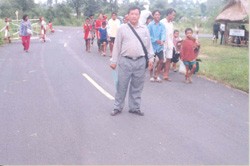
Sam Bunnath is a journalist in Cambodia’s Battambang province. In 2005, he attend a workshop for journalists that USAID sponsored as part of its effort to battle corruption in Cambodia. After the initial training effort, he and 11 other participants received one-on-one mentoring on investigative journalism. Sam and his colleagues were encouraged to put their training to practice and pursue leads on corruption — even on their own time, if necessary. They each received a small scholarship to offset the costs of investigative reporting.
Sam used his scholarship and new skills to investigate a scandal in which local education officials required teachers to pay “handler’s fees” to get permanent government-paid teaching positions. In many cases, teachers sold their all their belongings and land to pay the $300-450 bribe. Many of them were never offered the teaching job. Sam interviewed some two dozen sources for the story and gathered documents supporting the accusations of corruption. Not only did his investigation convince the public that these officials should be punished, but it also attracted the attention of the prime minister. The day after Sam’s story was published, the prime minister called for an investigation into the matter.
The USAID-sponsored program taught Sam the skills and confidence to pursue such a sensitive story, gather the necessary information from the education ministry, and push for the story’s publication. Cambodian journalists agree that editors at the Rasmei Kampuchea paper would ordinarily have been reluctant to publish the story. But the quality of Sam’s work and investigation convinced them to publish the full, unedited version.
Through training, mentoring, and scholarships, USAID’s program continues to help journalists in Cambodia pursue and reveal cases of corruption. The program’s next steps are to publish an investigative journalism training manual and offer prizes for excellence in reporting to reward those who excel in the field. Sam’s story is an important reminder of the great potential for change, and the courage and persistence it will take to keep fighting against corruption.







Comment
Make a general inquiry or suggest an improvement.